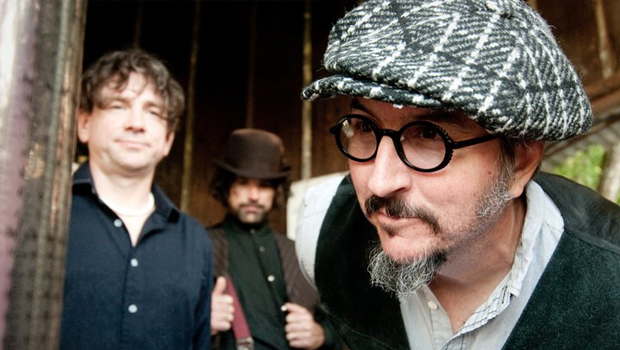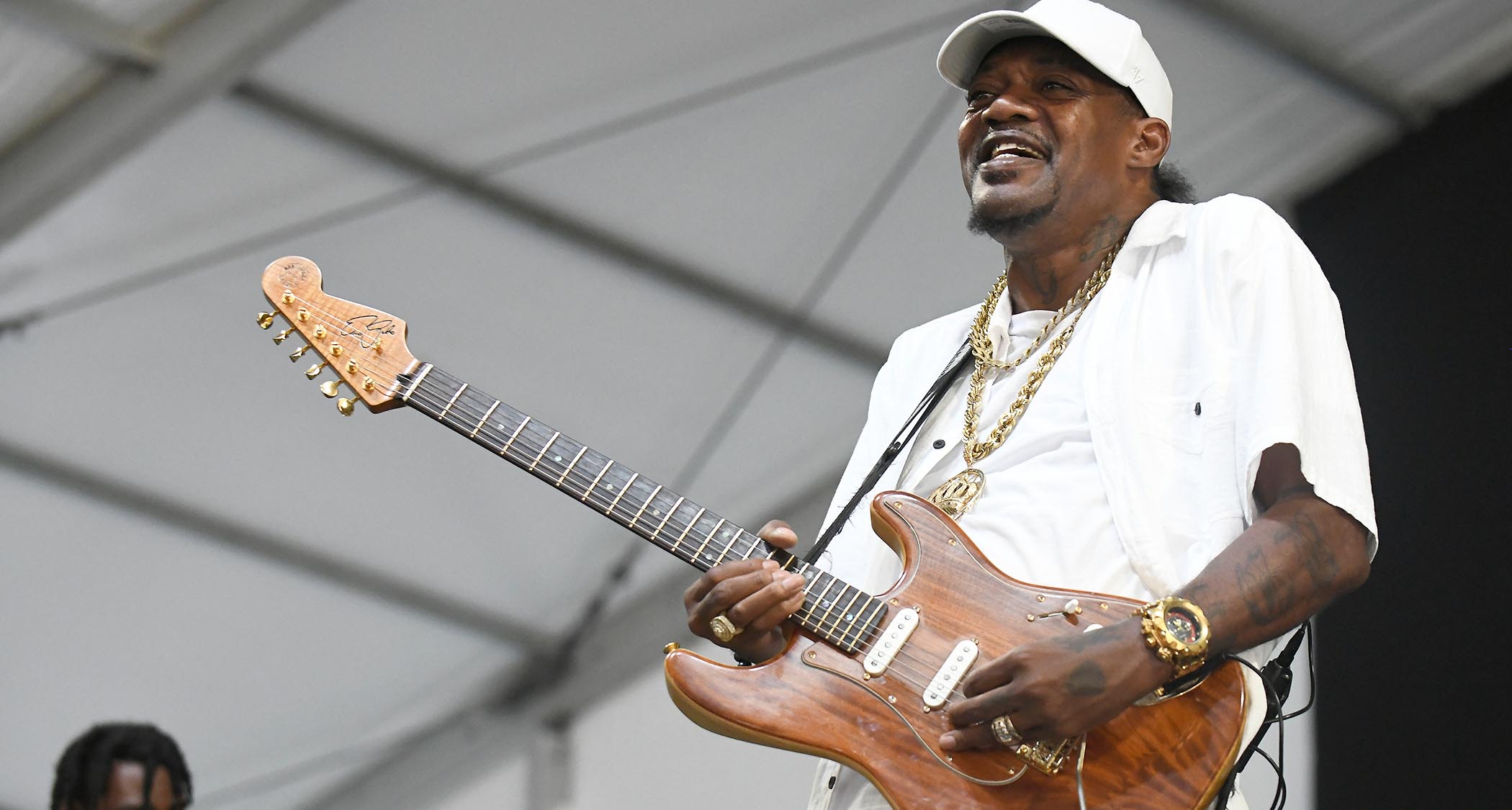All the latest guitar news, interviews, lessons, reviews, deals and more, direct to your inbox!
You are now subscribed
Your newsletter sign-up was successful

Has it really been more than a decade since we had a new Primus album? Maybe it's the timelessness of the band's bass-heavy grooves, but I know it certainly doesn't feel like 12 years since Antipop hit stores -- remember stores? You had to buy music there once.
If Primus were supposed to grow into stuffy adults and write mature, heartfelt ballads of years gone by, no one gave them the memo.
The band's first album of new material in the millennium, Green Naugahyde, is everything you've come to expect from a Primus record: Les Claypool's funked-out bass lines, Larry LaLonde's spacy, Zappa-inspired solos and even the return of a familiar face for Primus fans, drummer Jay Lane.
And in case you're worried about waiting another 10 years for the next Primus album, rest assured, this isn't a one-off project. As LaLonde revealed in our recent interview, Primus feels like a new band again.
GUITAR WORLD: At what point after Antipop did the band decide to take a break?
It was after we got done touring. At the end of the tour, we just kind of never came back together. That was usually the way Primus happened: We'll do a record, we'll tour and then when it's over we usually end up back in the studio, and it just didn't happen that time.
Before getting on to the new Primus album, catch us up on what you've been up to for the last decade-plus. I know you did some work with Tom Waits, Serj from System of a Down and then the No Forcefield record.
All the latest guitar news, interviews, lessons, reviews, deals and more, direct to your inbox!
Yeah, I mean that was about it, really. I think it was around 2000 when the Primus tour ended, I just kind of hung out in LA, surfing and making weird, avant-garde records. Some of 'em came out, some of 'em didn't. Then around '04, Primus ended up going back out and doing some touring and then that didn't really turn into a new record, and the same with the tour in '06.
After the 2006 tour I went out with Serj for a while and then only recently, I guess like a year and a half ago, the calls started to come in for offers for Primus to go out and do more shows. That time around it turned into me and Les talking and saying, "We don't want to go out and be a nostalgia band and not have a new record." So that's when we decided to put it back together and do a real record.
So obviously you were actively writing this whole time. Had you been stockpiling riffs for Primus?
Yeah, there were a lot of riffs around -- there are still a lot around that didn't get used on this album, that'll hopefully end up on the next one. I was always writing stuff, and there were some [riffs] that I was like, "If we were doing a Primus record, this would be a perfect riff." The song "Jilly's On Smack," I probably had that riff for four or five years. "Internal Consumption Engine" is another one that I've had around for a while, and I had "Moron TV" sitting around waiting to go on a Primus record.
Is there a certain quality to a riff that makes you immediately think it would be right for a Primus record?
Yeah, for the most part. I can sort of picture that it's an OK riff, but it really needs the other guys to make it into something cool.
Speaking of the other guys, how did the decision to bring Jay back into the band come about?
Well, we pretty much knew Tim wasn't going to want to do it, but we thought if Jay were to be back in the band we'd all be super stoked to make a new record. So we called him up, he was into it, and away we went.
Jay's definitely got a pretty distinct drum sound. How much did his style influence the sound of the record?
Probably a lot. He was definitely around for the writing of a lot of Frizzle Fry, and some of the songs from Sailing the Seas of Cheese were from when he was in the band, so it definitely had some of that same feel right off the bat. And he's the kind of guy that when you start jamming with him and start writing with him it kind of snowballs. It's really easy to come up with stuff with him.
Les even likened Green Naugahyde to Frizzle Fry in a recent interview. Would you consider that a fair comparison point?
I think so to some extent, but Frizzle Fry was also a record that we went in and recorded in like a week. [laughs] So we had a lot more of it worked out.
This one was definitely a lot more writing in the studio. It's kind of Frizzle Fry-esque, but also it feels sort of like a new band as far as the new songs and writing go.
What was your main guitar setup for the album?
The amp setup was super simple. It was a Fender SuperSonic into an EVH cab. We didn't have a lot of room, so we didn't end up with a million amps or trying a bunch of stuff. So we just had that amp setup with a clean and a dirty channel. Most of the album is probably my Fender American Deluxe Strat, which is brand new, and the rest is probably a '76 Strat and a '69 Tele Thinline.
You've always been known as a guitarist who is extremely technically capable but who will pull back for the sake of the song. What are some of the challenges to playing guitar in a band where the bass is way more upfront than most other bands?
It definitley forces you to be a bit more of a textural player. You end up trying to find holes to fit in. It definitely takes away from being a traditional rock player, with standard power chords and riffs -- although those things are still in there.
In a lot of ways, it can be pretty inspiring, too, because instead of playing something off the top of your head, you're listening a lot more and figuring out what the other guys are playing. I had a lot of bands I was into that were kind of like that. The Police were like that in a lot of ways. Bow Wow Wow were definitely a very bass-driven band.
It's also cool that you're not up front all the time, you can hide a bit more. [laughs] You can get away with a bit more, too. You can play some notes that maybe aren't supposed to be there. If you pick up the Mel Bay book, they would probably tell you not to play those notes, but sometimes you can get away with it more because the guitar isn't the total focus.
You definitely have a very unique taste for note choices. What school of music is that coming from?
A lot the songs come from guys like Snakefinger, or Fripp and Belew, who played a lot of notes that just weren't the ones you were expecting. Then solo-wise, it's probably a lot from Zappa. Also, I used to take lessons from Satriani, and we spent a lot of time sort of bending rules as far as theory and stuff -- coming up with keys that were weird and trying to solo over them, making scales out of random notes.
And how do you tend to go about working out your leads? Do you work them out in advance or is it mostly improv?
It's definitely almost all improv. I'll figure out what the bass is doing, and usually I'll have to write it out into some kind of new key I just had to invent.
I'll start to see patterns and different fingerings across the neck that are in that key because a lot of times you can't go to traditional things that you learned your whole life -- blues scales and things. You have to tweak them depending on what the bass is playing. But now I've got to go learn 'em all for touring! [laughs]
I think "Last Salmon Man" might be my favorite solo spot on the record. Is there one that sticks out a lot to you as a favorite?
Yeah, that one -- it was funny because we've been learning stuff for the tour and I'd been playing it and playing it, and now I listen back and it's like, "Hey, I guess I played something completely different than I thought I did on the record." [laughs] That one was fun because that was the first time I ever used a fuzz or any kind of distortion on a solo. For that one, I went with the full-on octave fuzz kind of thing. The last song on the album, "Exctinction Burst," has kind of a one-take solo thing, so I kind of like that one.
Talking to Spin, Les said this album was like Frizzle Fry, but with 20 years of life experience. How do you think you've matured as a musician in those two decades?
That's definitely valid. After 20 years, you've definitely got a lot more stuff to write about and you've heard a million different kinds of music -- and hopefully learned a bunch of different music. When we did the first record, I think I was 19. Up to then, I tried to cram as much guitar knowledge in as possible, but over time there's always more and more stuff out there to learn. So I'm sure we've all heard and played with a bunch of differnet people, and hopefully got something out of that.
I think also, recording after we've made however many albums, I've sort of learned to relax. Before, I was always so manic about trying to get everything perfect -- which if you listened to the records, you probably wouldn't believe that. [laughs] But not I'm trying to relax a bit more and not worry about it so much.
Easily one of my favorite things about the band has always been the music videos. Any chance of a new music video ala "Winona's Big Brown Beaver" for the new album?
That's what we're trying to figure out right now. Unfortunately, the budgets aren't what they used to be for videos, and the excuses to make 'em quite as big as they used to be when you could actually get something out of it. We're going to try and do whatever we can get together and pull off, but it definitely used to be great to be able to make all the crazy videos.
You said earlier that you already had some riffs for the next Primus album. Do you see this being a case of the band going out and touring then making another album?
Right now it feels kind of like it's a band again, and we're just going to keep going as long as people are interested in seeing us and hearing us.
The new album from Primus, Green Naugahyde, is out tomorrow, September 13.
Josh Hart is a former web producer and staff writer for Guitar World and Guitar Aficionado magazines (2010–2012). He has since pursued writing fiction under various pseudonyms while exploring the technical underpinnings of journalism, now serving as a senior software engineer for The Seattle Times.

